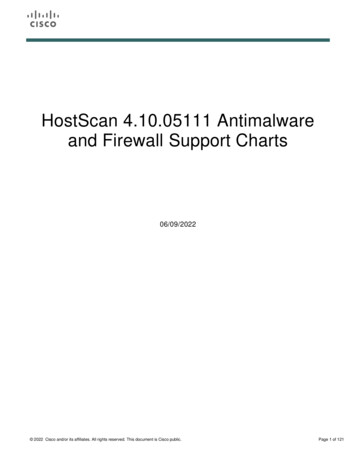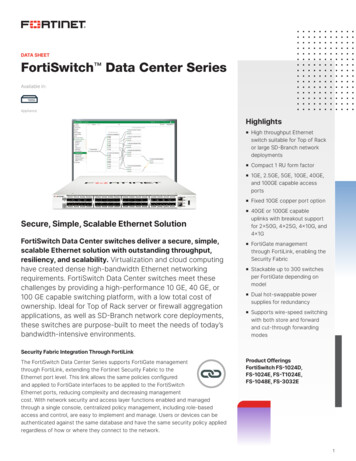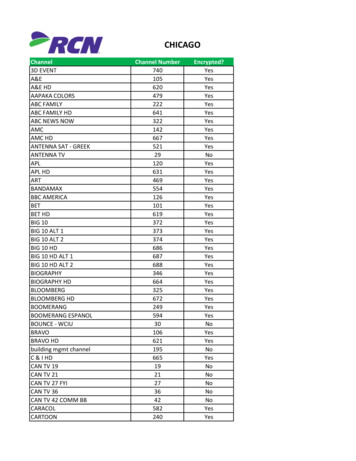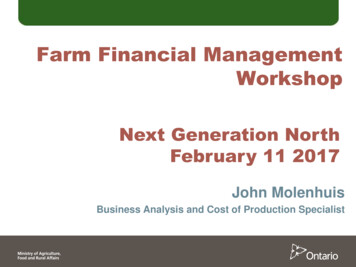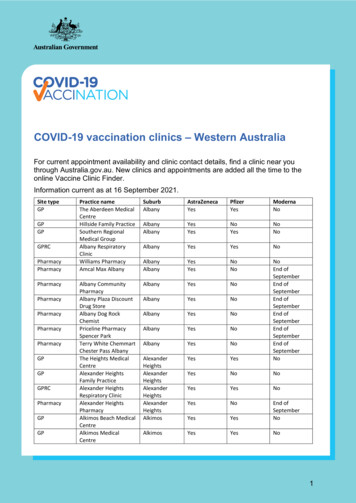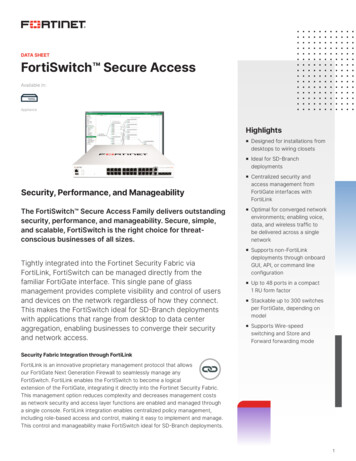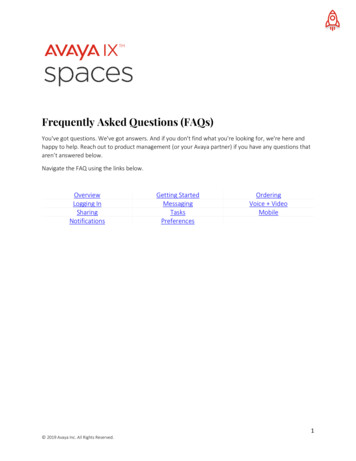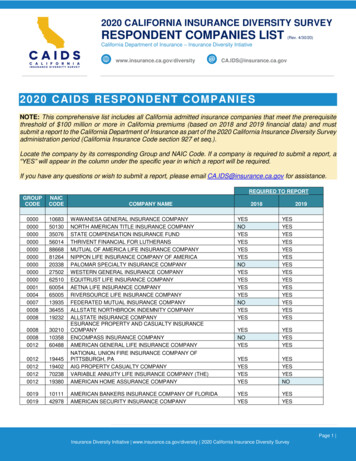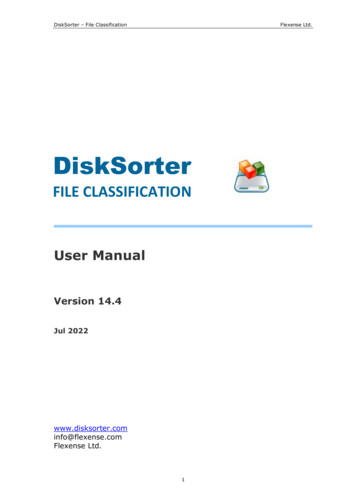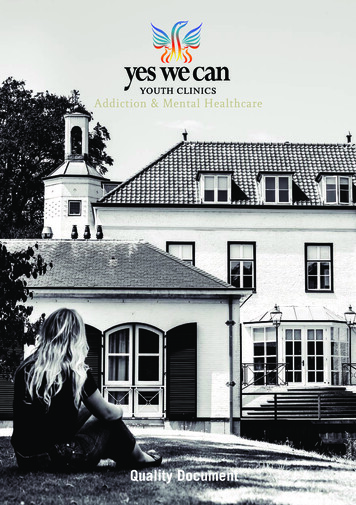
Transcription
Quality Document
Yes We Can Youth Clinics – When all else failsYes We Can Youth Clinics provides clinical care for 13-25 year olds struggling with mentalhealth issues, addictions and behavioural problems. Many clients (fellows) we treat have foundthemselves lost in the healthcare system.The collaborative approach at Yes We Can Youth Clinics has proven to be a turning point in thelives of thousands of teenagers, young adults and their families: Atmosphere: at Yes We Can Youth Clinics, we offer unconditional warmth and a safe environmentwhere problems can be shared and discussed openly, but we do not shun confrontation either.A lot of our fellows struggle with similar problems, just like many of our employees did in thepast. This similarity creates recognition and strengthens the group spirit. The strong groupdynamics ignite the willpower to really change. Team: Yes We Can Youth Clinics works with multi-disciplinary teams. Healthcare specialists workside by side with experts by experience and youth coaches. At Yes We Can Youth Clinics, morethan 200 passionate professionals work for and with the fellows. Programme: we offer an intensive 10-week residential programme and tailor-made aftercare.Fellows learn to acknowledge their problems, to get to the root of these problems, how to ask forhelp and how to deal with the issues they are facing. In week 5, family members are requiredto attend a 4-day family coaching & counselling programme, designed to motivate parents andcarers to take responsibility for their changed role. We will also shed a light on what permanentrecovery means for the entire family system.Treatment at Yes We Can Youth Clinics has proven to be very successful for many teenagers andyoung adults. More than 70% of our fellows no longer need specialised healthcare after havingcompleted the programme.2
AboutSince 2010, Yes We Can Youth Clinics with a current capacity of 140 beds, has grown to becomea leading treatment centre for young people (age 13 to 25) suffering from mental health issues,addictions and behavioural problems. Fellows (we prefer this term over patient or client) follow anintensive residential treatment programme of 10 weeks and 4 to 12 weeks of (residential) aftercare.Parents/carers follow a mandatory family coaching & counselling programme. The entire conceptis based on a unique, yet very effective and profoundly evidence based treatment method.LocationsThe residential treatment centres are based on the Groenendael estate in Hilvarenbeek, theNetherlands. The International centre (20 beds) is situated in a 13th century castle, whereas theDutch centre (120 beds) is located next door in a modernised building formerly used as a trainingcentre by multinational Philips. Yes We Can Youth Clinics also operates offices for management, intakes and aftercare in London, Oirschot, Eindhoven, Heeze and Abcoude.3
4
Description of care provision and professional networkYes We Can Youth Clinics offers specialist mental health care for young people age 13 to 25 andfor their parents/carers with a unique vision and approach. We treat young people from all over theworld. Yes We Can Youth Clinics works with (positive) group dynamics. Our approach is individual,systemic and with a tight framework programme. This programme is described and theoreticallysubstantiated. We are there for those who completely got stuck in their development and oftenhave gone through all kinds of (emergency) care path(s).Treatment chain specialised mental health careYoung people treated at Yes We Can Youth Clinics face multiple problems and serious limitations intheir functioning within different living domains. The motivation for change and degree of sufferingvary. Sometimes the environment suffers more than the younger person and vice versa. Youngpeople often have little problem awareness and a reluctant willingness to change. Problembehaviour can manifest itself in various ways such as: gloom and suicidality, aggression, abuseand traumatisation, attachment problems, eating disorders, self-mutilation, crime, absence fromschool, isolation with retreat in their own room, gaming, unemployment, gender identity issues,sexual, mental and physical abuse and substance addiction. Because these young people alreadyhad a lot of treatment and/or got stuck in such a way, treatment in their own environment no longersucceeds. An ambulant offer is not a workable option for this group.Yes We Can Youth Clinics offers an intensive internal clinical treatment programme of 10 weeksplus aftercare for the youngsters and an intensive programme for parents/carers. A psychiatrist,psychologist and case manager are present during the intake. During clinical admission, thepsychiatrists, psychologists, youth coaches, nurses and counsellors coordinate the care processtogether and as a team they are responsible for the integral treatment process.Structural cooperation partnersWith the parties on the next page, Yes We Can Youth Clinics has formal agreements for theimplementation of its care activities or continued care. Our care network extends to over 600healthcare professionals wordwide.5
OrganisationRoleDr Paul BainConsultant Child And Adolescent Psychiatrist,London, United KingdomFarmedvisieElectronic medication subscriptionInfinitCareSupplier benchmark dataMedicoreSupplier EPDReo ZorgPharmacyThe McLellan PracticeProvides schools with a comprehensive range of speakers andsupport covering important, challenging and sensitive issues.Zero SanoSafe houseYes We Can Youth Clinics guarantees chain collaboration through good coordination with referrers(GPs) and other healthcare professionals. We provide proper transfer in case young people needadditional care or support upon treatment completion. Yes We Can Youth Clinics carefully selectsher partners beforehand. In order to provide continued care, Yes We Can Youth Clinics finds itimportant that chain partners share the same vision of care and offer the highest standards ofquality (sticking to abstinence is for example an important condition, as are safety and reputation).6
Organisation of careTeamWe offer the highest standards of treatment in a very safe environment. More than 200 healthcareprofessionals continuously look after 140 young people at any given time and we maintain thehighest staff to fellow (client) ratio. The team consists of extremely passionate professionals,including BIG-registered therapists such as psychiatrists, psychotherapists, addiction doctors andhealthcare psychologists. In addition, we work with family therapists, experts by experience, youth/educational workers, socio-psychiatric nurses, educationalists, systemic therapists, nurses andyouth coaches to support and supervise the treatment process. A personal case manager andtherapist guide families through the process from start to finish.Special note: therapists have a caseload of max 4 fellows each, whilst full-time employed.7
CompetentYes We Can Youth Clinics works with well-trained, registered (if applicable) professionals. Theymeet the requirements that apply to their profession and adhere to their professional code.Yes We Can Youth Clinics works with job descriptions in which relevant competencies andjob requirements are included, both aspects being leading in the recruitment and selection ofemployees. The HR department has a standard method for checking diplomas, registration andCertificates of Conduct.Yes We Can Youth Clinics works according to the highest care standards and guidelines. Weuse Evidence Based Treatment Methodologies, such as motivational interviewing, cognitivebehavioural therapy and Attachment Based Family Therapy. The theoretical part of the treatmentis summarised in a workbook that the fellows use during their treatment, based on the ‘10 actions’.An instruction manual has been devised for new employees, including detailed descriptions aboutthe approach and distribution of tasks/responsibilities.Securing expertiseThe Yes We Can Academy provides an intensive programme for all new employees. The mostimportant learning objective is to introduce all employees in the vision, mission and treatmentmethodology of Yes We Can Youth Clinics. Every new employee has a trial period and initially atemporary appointment. This period is accompanied by an introduction programme, organisedper discipline. These periods are concluded with a performance evaluation. This is repeatedannually via performance appraisals. Yes We Can Youth Clinics also uses external supervisors asan InterVision for practitioners, counsellors and case managers.Professional status incl. escalation procedureCollaboration within Yes We Can Youth Clinics is laid down and guaranteed in a professionalstatute. An escalation procedure is also laid down in this statute, should a difference of opinionarise about the treatment within the multidisciplinary team. This professional statute has beenpublished on the intranet and is thus available to all employees.8
Internal Multidisciplinary MeetingsYes We Can Youth Clinics coordinates the intake internally via Multidisciplinary Meetings, in whichall those involved are present; the treatment coordinator, the expert by experience case managerand the psychiatrist. The multidisciplinary meeting or MDM is a meeting where discussionabout the treatment plan takes place and the daily progress and development of each fellow aremonitored. A record of the intake and reconciliation is made in the electronic patient file. Duringclinical treatment, Multidisciplinary Meetings take place 3 times a day. Agreements about thetreatment of a young person are recorded in the electronic medical patient file. In addition, thereis coordination between the treatment coordinators, the counsellors of the family programme, theaftercare counsellors and the practitioners in the clinic.File handling and handling of patient dataYes We Can Youth Clinics uses the following documents/arrangements for handling patient data:RegulationPermission of the patient to share data with professionals not involved in the treatment.Guidelines from the professional group, including the reporting code for child abuse anddomestic violence (in case of conflict of obligations, suspicion of child abuse or domesticviolence).The step-by-step physical check / check plan for the health insurer.Privacy statement if the patient does not want to make his diagnosis known to his health insurer/ DISSubmitting ROM data to the Foundation Benchmark Mental Healthcare at an aggregated levelfor benchmarking purposesComplaints and dispute settlementYes We Can Youth Clinics has published a complaints procedure on the website and intranet. Acomplaint form can also be found on the website. Yes We Can Youth Clinics is also affiliated withthe mental health disputes committee. On the site you will find a link with further information aboutthe disputes committee. International disputes are to be settled arbitrary based on Dutch law.10
The treatment processWaiting time for intake and treatmentAfter registration on the website, a (telephone) confirmation of receipt of the form will follow within24 hours. In practice, most international families and referring parties call first. Subsequently,the treatment team screens the form/referral within 48 hours and, if necessary, makes amultidisciplinary decision about whether or not the young person is invited for an intake. Theparents/carers are also contacted by telephone within 48 hours to see if the intake is going totake place or whether missing information is requested. Then an intake is scheduled as soonas possible (we stay within the so-called ‘Treek standards’ – maximum accepted waiting times).The moment of admission depends on capacity levels and financial arrangements. Accelerated/immediate admission is possible in exceptional cases. In case of waiting list procedures, Yes WeCan Youth Clinics offers help for bridging care solutions in close coordination with the varioushealthcare partners all over the world. Current information about the waiting times can be found onthe website of Yes We Can Youth Clinics.Registration, intake and diagnosisAfter an extensive, warm explanation by case management, where all questions have beenanswered by telephone, the family, young person and the possibly referrer are invited to register viathe website. An initial screening follows on the basis of the registration form, the referral letter fromthe general practitioner and a possible report of care history.As soon as the first screening shows that treatment may be appropriate, an intake will follow at thehead office in Oirschot. For inclusion criteria, please refer to the website or the the Yes We CanYouth Clinics Treatment Method. Prior to treatment, health insurance coverage will be coordinated,if applicable. Parents/carers will extensively be informed about the treatment agreement, includingall financial and other commitments, which needs to be duly signed before admission.11
The youngster and his/her parents/carers are invited together for an intake. The intake lasts half aday. The intake starts with an extensive introduction, supervised by an expert by experience casemanager. He/she provides information about the organisation and the treatment. He/she takes thetime to listen to the experience of the youngster and his/her parents/carers. He/she will also speakabout his/her own experience, often triggering a deep, real contact with the youngster. Experienceshows that this is often the point young people start getting a simmer of hope that change mightbe possible, that finally someone really understands their needs and sorrows. Then follows aconversation with a treatment coordinator and a psychiatrist. At the end of the intake, a report isgiven to the youngster and his/her parents/carers. It also explains why Yes We Can Youth Clinicsmay or may not offer a suitable solution. If necessary, alternative care or support is advised.After the intake, we will inform the referrer and/or relevant healthcare professional involved. YesWe Can Youth Clinics wants to coordinate the care with them and, if necessary, make agreementsabout how support is organised within the family, but also about the care coordination aftertreatment has ended.Residential treatmentA treatment agreement and an individual treatment plan are agreed with all young people and theirparents/carers. The treatment plan contains goals and agreements about the treatment.The treatment is structured as follows: at the intake it appears that treatment is expected to beappropriate. A welcome file is then sent regarding information on appointments/house rules,check-in/check-out, the clinical programme and details about the family programme. On the dateof departure, all departing young people gather at the head office in Oirschot. Yes We Can YouthClinics provides transport to the clinic. A period of 5 weeks follows, in which there is no directcontact with the home front, much needed for the recovery process to really kick-off.All young people start with the care path ‘acceptance and change’, regardless of diagnosis andtreatment. During the intake, a preliminary diagnosis was drawn up by the psychiatrist andafterwards individual treatment goals were drawn up together with the youngster and parents/carers. At the start of clinical treatment, the therapist examines with the young person what his/her problem behaviour looks like, analyse how it could have gotten to this point and what damagethis behaviour has caused. Insight into the background of this behaviour is created. The youngsterthen works towards the motivation for change and takes a first step in creating a new perspective.For every young person it is necessary to go through the different phases of change and the tenActions (derived from the 12step model and adapted to the specialist programme of Yes WeCan). These actions are reflected in the Yes We Can Youth Clinics programme: there is a commonstructure (treatment is ten weeks, a different action is centralised each week) and the youngpeople follow the same general modules in combination with individual goals as set out in theindividual treatment plan.12
The following general modules are applied: Workbook with the Ten Actions Community meeting Group therapy Individual therapy Activity programme Bonding day Somatic care Medical-psychiatric diagnosis and treatment.The specialist programs are referred to as ‘clean and sober’, ‘flow and flex’ and ‘self-confidence’.The specialist programs focus on addiction problems, externalising behaviour and autism problemsor internalising behaviour, for example depression, anxiety or eating disorder.About our treatment Yes We Can Youth Clinics absolutely delivers the most intensive treatment programme foryoung people between 13 and 25 years old suffering from mental health issues, addictions andbehavioural problems. Seven days a week, fellows (clients) follow a structured schedule starting at6.45 am until lights-out at 11 pm. Every week, fellows receive a minimum of 3 hours of intensive one-on-one therapy with aprofessional therapist. Weekly they receive 20 hours of group therapy in the form of group sessionsled by an expert by experience counsellor. These sessions are designed to create recognition ineach other and give room for fellows to share their thoughts and feelings. This form of therapystrengthens the group dynamics and creates a bond between fellows as a group and the therapist. The fellows also engage in 27 hours of (sports) activities and they get 10 hours of education aweek. Activities range from fitness, mountain biking and climbing on a high ropes course on ourown premises to activities at the beach and in the woods. These activities are meant to motivatethe fellows to work together and show them what they can actually achieve physically. Fellows geteducated by watching pro-recovery documentaries, hear the stories of different speakers and bygetting all types of training and workshops. During the daily closing of the day, fellows can vent and get everything they need of their chest, sothey can go to bed with a clear mind and start fresh the next day. The weekends are filled with psycho education, group sessions, lectures and a lot of sports activities. There is no access to the internet, phones, tablets, TV or any other device that can distractyoungsters from recovery. We do this to let the fellows bond with each other and connect inthe right way.13
14
Family coaching & counselling programmeYes We Can Youth Clinics stipulates that parents/carers participate in the family programme asa non-disputable condition for treatment. This family programme runs parallel to the clinicaltreatment programme and comprises 4 full days, excluding assignments at home. A workbookwith written assignments and additional reading material is also made available. The maintheme is co-dependency. Parents gain insight into problem-maintaining family patterns and theinterpretation of the changing parent role that fits with age. The family programme is supervised byan experience expert family counsellor and a therapist. The parent programme takes place at ourhead office in Oirschot.Halfway through the clinical programme and after 5 weeks of no communication, a bonding dayis organised in the clinic between the youngster and his/her parents/carers. It is an intense andemotional day during which communication, which often seriously has been disrupted, is restored.In the home environment, people often stopped listening and mutual trust had disappeared.Bonding day is supervised by a practitioner and expert by experience (family) counsellors. Theday starts with a therapeutic group session for parents and fellows separately. Afterwards, theyoungster and parents/carers talk to each other about important events. The basis for constructivecommunication is laid.Evaluation and involvement of the case managerThe treatment is coordinated through daily Multidisciplinary Meetings. Based on these discussions,the treatment plan is determined, evaluated and adjusted, as is the final report (transferdocument). The evaluation can also use standardised OQ45 questionnaires, which are completedduring the intake phase and in the final phase of clinical treatment. These data are used forRoutine Outcome Measurement (ROM). The entire process is coordinated by a case manager.Final interview and transferClinical treatment is concluded with a final interview with the youngster and his her parents/carers, carried out by the treatment coordinator at the head office in Oirschot. They receive asummarising final report and recommendations for successful recovery at home. The final report isstored in the medical file and sent to the relevant referrers, only with the strict consent of both theyoungster and his/her parents/carers.15
AftercareAfter completing the 10-week residential programme in the clinic, fellows have to face the mostcritical phase of the treatment process. They have rebuilt self-confidence, are motivated again, feelmore energetic and are ready to make new plans. At the same time, they are insecure becausethey may have changed, but their social environment has stayed the same. For that reason, it isessential they receive a great level of support during this period.Aftercare will start right after clinical treatment. One major part of the recovery process is to findpurpose again. After spending 10 weeks in a safe and warm environment, going back can be veryconfronting, causing old behaviour and convenient habits to recur. Not being in a safe environmentwith the right guidance can lead to relapse and trigger severe consequences.In close cooperation with the family, the fellow, possibly a referring therapist and our global networkof healthcare professionals, a clear and attainable tailor-made programme will be suggested for theyoungster to follow at home, if needed supervised by a Recovery Coach.16
EffectivenessSurvey results show that treatment at Yes We Can Youth Clinics* works. Of those teenagers andyoung adults that have completed our programme: 72% no longer need intensive mental health care or additional assistance; 89% remain in recovery after treatment; 96% are better equipped to deal with personal problems and challenges; 83% fill their days with meaningful activities such as (voluntary) work or school.Yes We Can Youth Clinics* is accountable annually by publishing its achievements at the Ministryof Health, Welfare and Sport. Yes We Can Youth Clinics* is also affiliated with the FoundationBenchmark Healthcare and provides data on the outcomes of care provided (Routine OutcomeMeasurement, also called ROM). We analyse the outcomes of the ROM in collaboration withPraktikon (part of Radboud University). In addition, Yes We Can Youth Clinics* carries out customersatisfaction surveys on a structural basis.Client satisfactionYes We Can Youth Clinics* structurally measures client satisfaction with standardisedquestionnaires (CQi and GGZ thermometer) that are used nationally to enable comparison (Yes WeCan Youth Clinics* ranks 3rd amongst more than 70 institutes benchmarked). Many young peopleand parents also react on ZorgkaartNederland (99% recommends Yes We Can and is rated 8.5 outof 10).In addition, Yes We Can Youth Clinics* maintains very direct and warm contact with her fellowsand parents/ carers. Also after lengthy periods, we receive proud and grateful stories from fellowsand parents about obtaining a diploma, a year of abstinence, but also about their difficult periods.Yes We Can Youth Clinics* asks fellows and parents/carers actively to share their recovery storieswith us and with each other. Where possible, Yes We Can Youth Clinics* seizes opportunities toacquire in-depth knowledge to identify opportunities for improvement. The client council also hasan important role to play in this.*Based on research among thousands of Dutch clients17
CQI Benchmark GGZAboutTotalNResponseAverage participantScore (95% CI)8.2662017%Yes We Can Youth Clinics8.716062%Treatment with end date from January 2017 up to and including December 2017.Response response within the measurement domain Complaints and Symptoms (percentage of number oftreatments of which the treatment outcome is calculated within the measurement domain in relation to the totalnumber of treatments).N Number of treatments (rounded off to 10-numbers, an N 10 is always rounded to 0) forwhich treatment outcome is calculated.SBGIndex 1. Treatment Outcome measurement domain Complaintsand SymptomsΔTNResponseNational average9.11054037%Yes We Can Youth Clinics10.820074%AboutTreatment outcome ΔT (95% CI)Treatment with end date from January 2017 up to and including December 2017.ΔT Delta T (measure for treatment outcome).N Number of treatments (rounded off to 10-numbers, an N 10 is always rounded to 0) for which treatmentoutcome is calculated.Response response within the measurement domain Complaints and Symptoms (percentage of number oftreatments of which the treatment outcome is calculated within the measurement domain in relation to the totalnumber of treatments).Index 2. Response rate finished DBC processesAboutNational averageYes We Can Youth ClinicsResponse rateNumber36%22%73%6%36%21%156080270DBC routes (rounded off to 10-numbers) with end date from January 2017 up to and including December 2017. preliminary and post-measurement only pre-measurement only post-measurement no measurements18
Inspection and quality controlThe Dutch Healthcare Inspectorate (IGZ) assessed Yes We Can Youth Clinics, focusing on a totalof 24 areas, varying from employing competent and knowledgeable staff to official certification ofquality. In its final report, the IGZ concluded that Yes We Can Youth Clinics performed well in all 24areas.The certified quality management system of Yes We Can Youth Clinics meets and continues tomeet all the demands as set forth by ISO9001:2008. In addition, Yes We Can Youth Clinics is HKZcertified (HKZ certification scheme for Mental Healthcare 2009). This means that our processesand protocols are not only defined, but also systematically evaluated and adjusted wherenecessary.TransformationFor Dutch residents, Yes We Can Youth Clinics has contract agreements with practically allmunicipalities in the Netherlands regarding care provision for under 18. Yes We Can Youth Clinicsshapes its partnership with municipalities with expertise and policy development, particularly onsustainability and social return.Care for young people up to the age of 18 is reimbursed in the Netherlands by municipalitiesand regions (local government). The Netherlands is divided into 50 regions in which all 384municipalities are represented. All regions/municipalities endeavour to provide the best care fortheir youngsters and each uses their own methodologies. Yes We Can Youth Clinics has beencontracted by 97% of all municipalities because our care meets the highest quality standardsset by the municipality, young people and parents are very satisfied with the treatment and thetreatment is very successful. Care for young people older than 18 is reimbursed by health insurers.Health insurers also apply their own criteria to contract healthcare providers. The treatment of YesWe Can Youth Clinics is reimbursed by almost all health insurers.Internationally we work, amongst others, with S2 forms (European Cross Border Healthcaredirective), BUPA International and AXA.19
Figures 2017/2018Rating young people18-238,7Young people from allover the worldScore Dutch Mental Health Care Meter 18-100%8,5Reccomended on‘Zorgkaart’ (largestDutch Health Carereview website)Ages13 t/m 2599%Mental health issuesAddictionsNumber of FTEBehavioural problemsRating parents8,21733Score Dutch mental health careBenchmark FoundationNumber of treated fellows (clients)20211991Number of employees
ContactPiet JansenJules JansenKelly LemckertDirector of International RelationsCase ManagerFinance and Care AdministationAddress Head OfficeBestseweg 345688 NP OirschotThe Netherlands 31 85 020 1222Address ClinicGroenendaal 15081 AM HilvarenbeekThe Netherlands 31 85 020 1222Adress London office35 Great James StreetLondon WC1N 3HBUnited Kingdom 31 85 020 nclinics.comk.lemckert@yeswecanclinics.com
www.yeswecanclinics.com
Yes We Can Youth Clinics offers specialist mental health care for young people age 13 to 25 and for their parents/carers with a unique vision and approach. We treat young people from all over the world. Yes We Can Youth Clinics works with (positive) group dynamics. Our approach is individual, systemic and with a tight framework programme.
